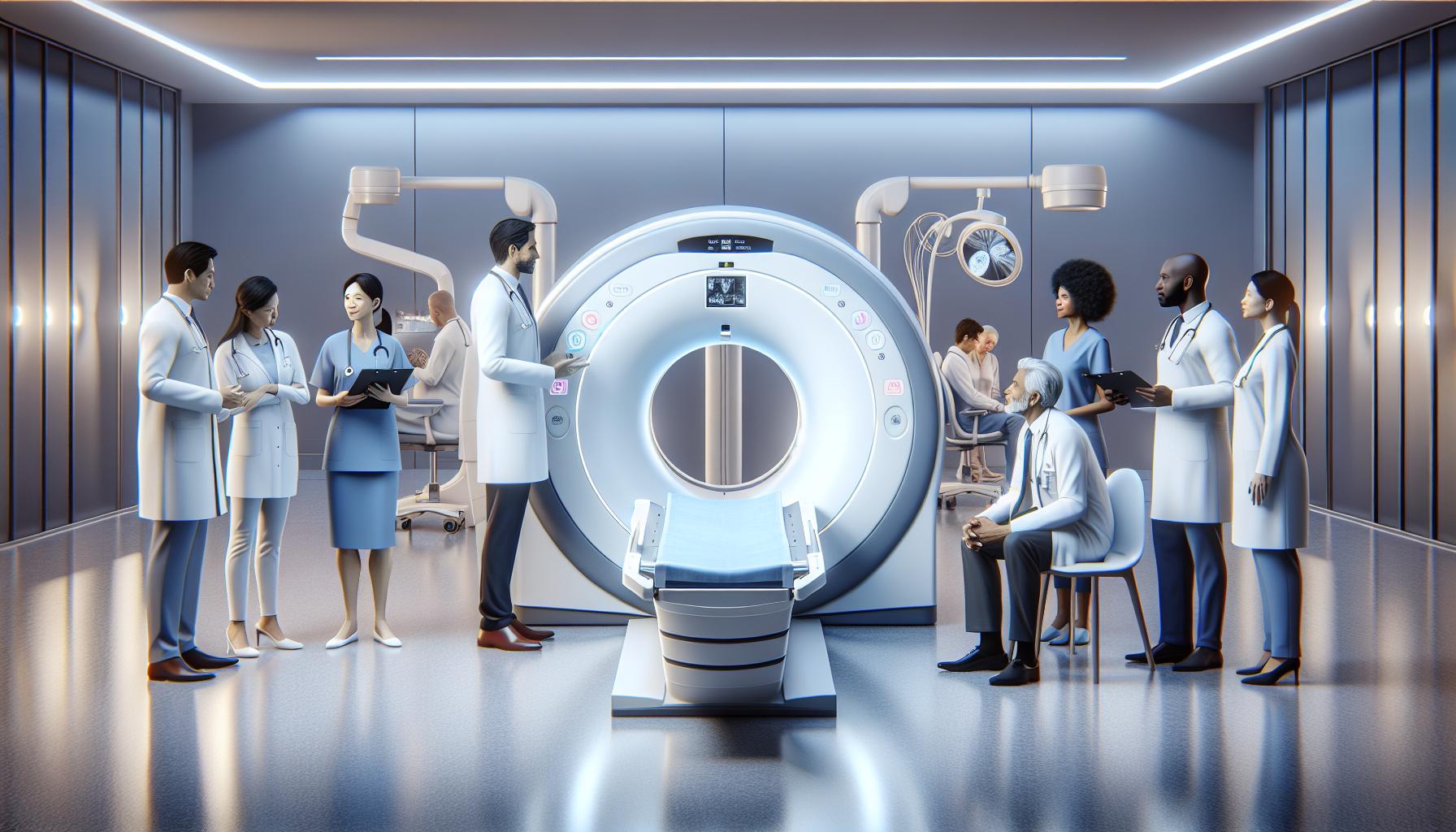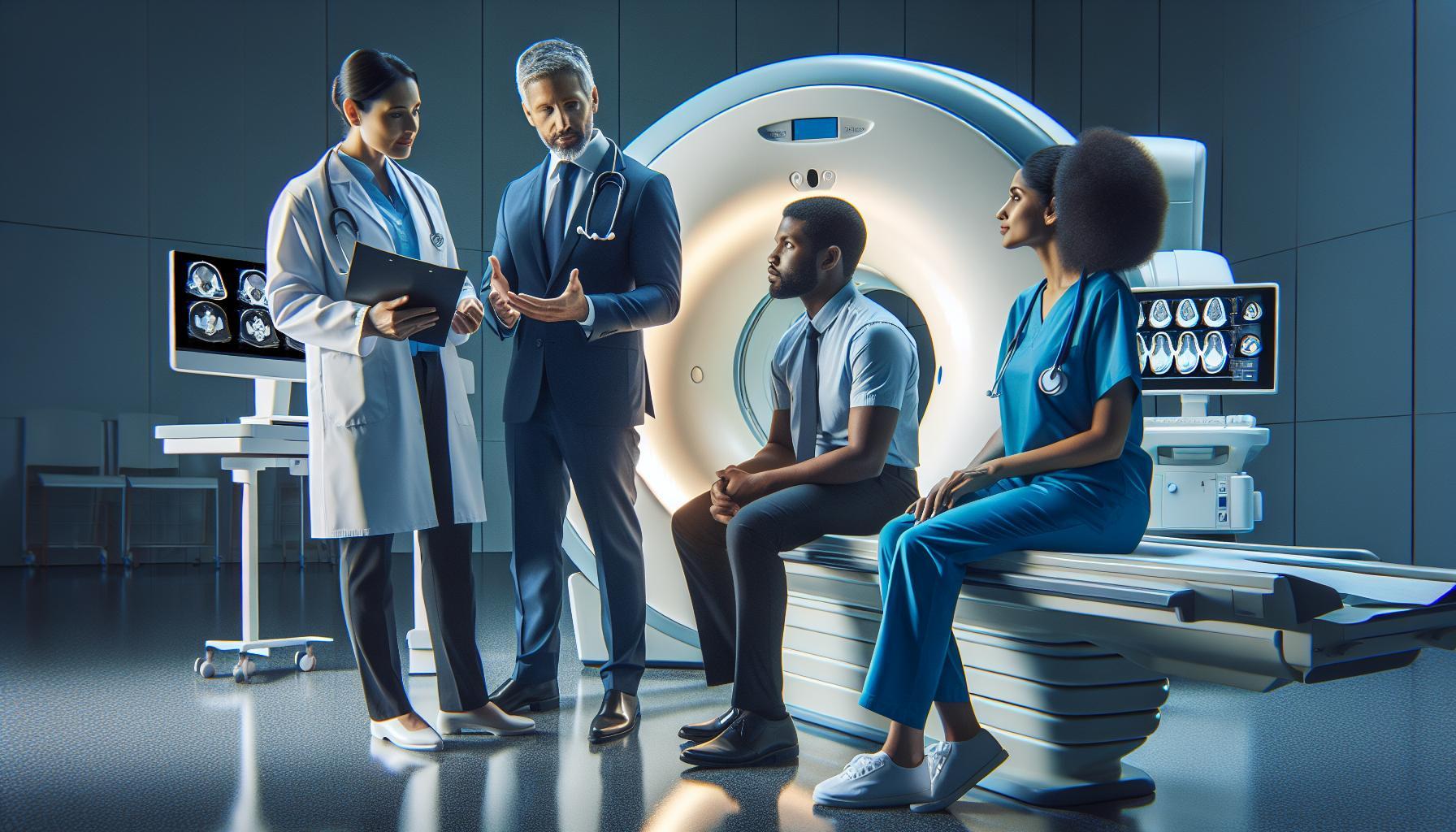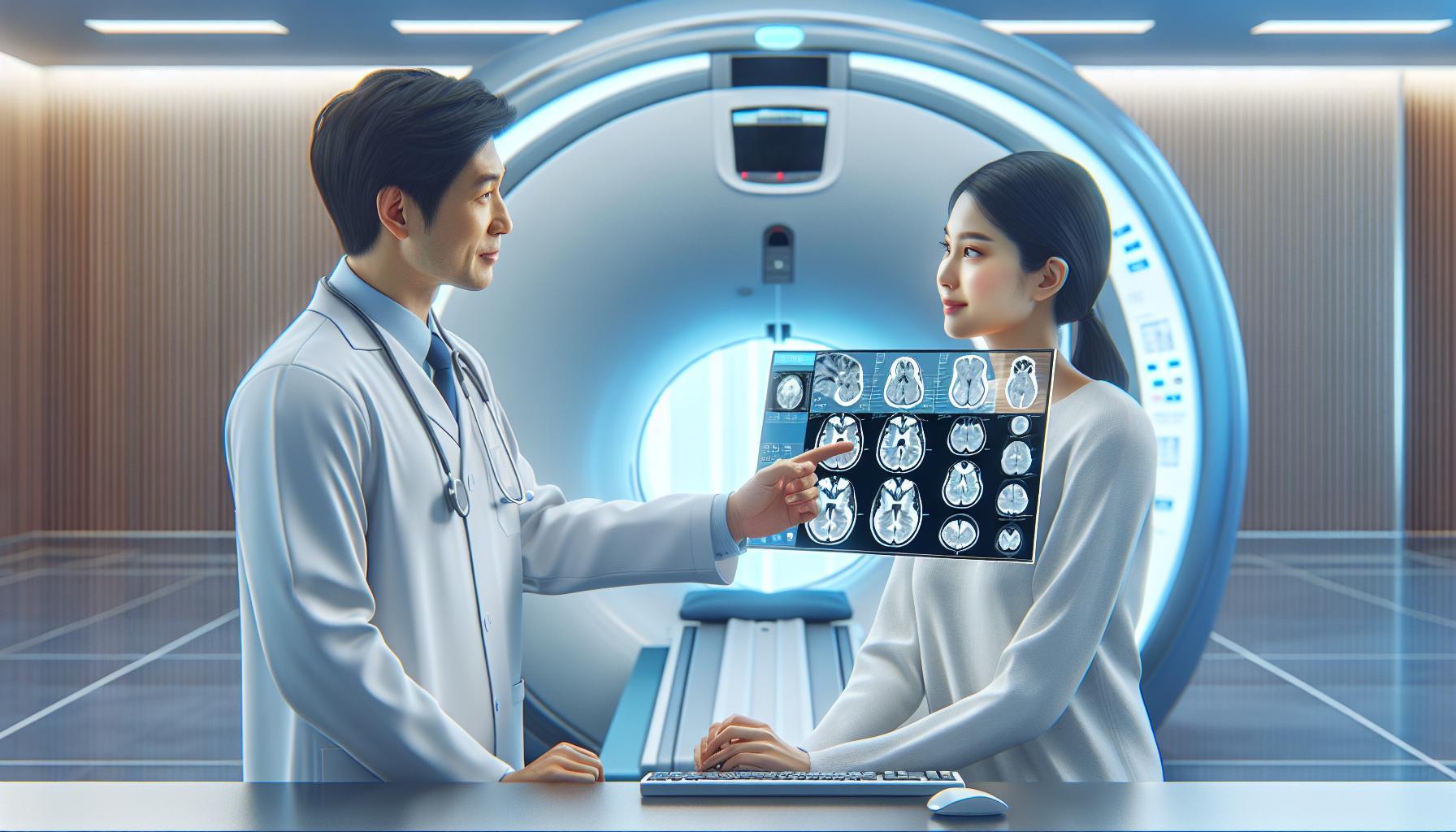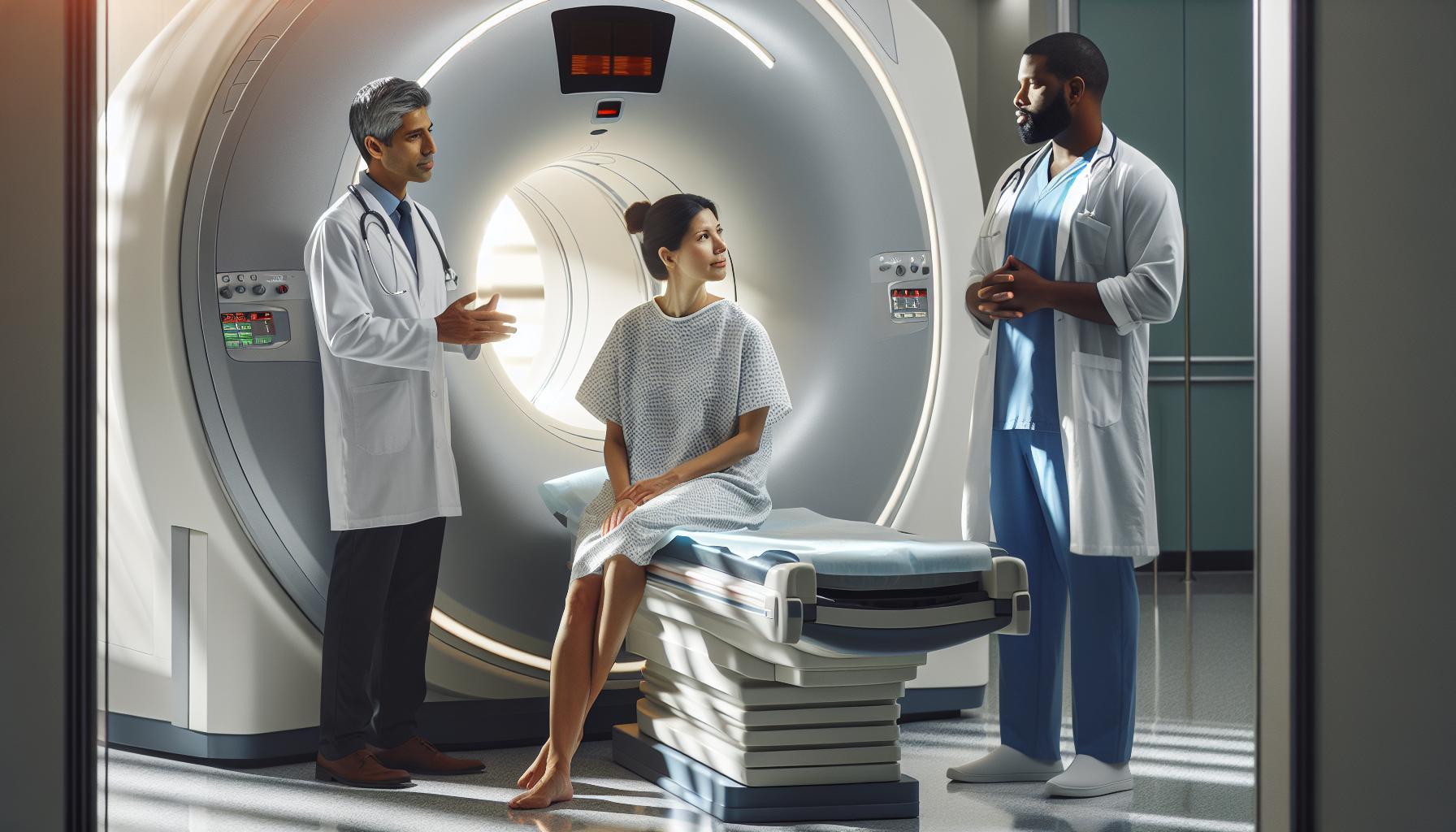Did you know that the cost of a CT scan can vary significantly depending on several factors, including location, facility type, and whether you have insurance? Understanding the average price of a CT scan is crucial for patients who may be facing significant medical expenses. This imaging procedure, which provides detailed cross-sectional images of the body, is essential for accurate diagnosis and treatment planning.
Navigating the financial aspects of healthcare can be daunting, especially when you want to focus on your well-being. By breaking down the costs associated with CT scans, we aim to empower you with the knowledge necessary to make informed decisions about your health care. Whether you’re scheduled for a scan or simply exploring your options, knowing the typical costs and what influences them can help alleviate some of the anxiety surrounding medical expenses. Join us as we delve into the factors that contribute to the average cost of a CT scan and how you can prepare for this important procedure.
Understanding the Cost Factors of a CT Scan
When considering a CT scan, it’s essential to understand that various factors contribute to the overall cost. Whether you’re preparing for a routine procedure or a more specialized scan, knowing what elements influence pricing can help you make informed decisions and potentially ease any financial concerns.
Several factors determine the cost of a CT scan. Geographic location plays a significant role; prices can vary dramatically between urban and rural settings. In metropolitan areas, for example, the cost might be higher due to increased demand and operational expenses associated with providing advanced imaging technology. Additionally, the type of facility-whether it’s a hospital, outpatient clinic, or diagnostic center-can impact pricing as well; hospitals typically charge more due to overhead costs.
The complexity and type of the CT scan also affect the price. Standard scans are generally less expensive than specialized or advanced scans, which may require additional technology or longer processing times. For instance, a simple abdominal CT scan may range in cost, while a more detailed scan such as a CT angiography could be significantly more expensive.
Another key consideration is the role of insurance. Coverage plans vary widely, impacting how much of the total cost you’re responsible for paying out-of-pocket. It’s crucial to check with your insurance provider to understand your plan’s specifics regarding covered services and any potential deductible or co-payment amounts. Moreover, facilities may have options for payment plans or financial assistance, which could alleviate some of the financial burden. Understanding these various cost factors can prepare you better for the experience while ensuring you receive the necessary care without unnecessary stress.
Average Prices: What to Expect Nationwide
When planning for a CT scan, understanding the average costs can significantly ease concerns. Nationwide, the prices for CT scans can fluctuate widely, reflecting not only the complexity of the procedure but the geographical setting and type of facility offering the service. On average, patients can expect to pay anywhere from $300 to $3,000 for a CT scan, depending on various factors.
In larger urban hospitals, costs tend to be on the higher end due to maintenance of advanced technology and high operational expenses. Conversely, smaller outpatient clinics and diagnostic centers might offer more competitive pricing. Here are a few examples of average prices to give you a clearer picture:
- Abdominal CT Scan: Approximately $500 – $1,000
- Chest CT Scan: Approximately $400 – $800
- CT Angiography: Approximately $1,000 – $3,000
These variations emphasize the importance of checking with your local facilities to obtain specific pricing information. Additionally, it’s worthwhile to ask about any available packages, as some facilities may offer bundled services that can reduce overall costs.
It’s essential to remember that while cost is important, the quality and accuracy of the imaging service should also be a priority. Investing in a reputable facility with the latest technology can lead to clearer images and more accurate diagnoses, which can ultimately save time and costs associated with further testing. Balancing these factors will help you make the most informed decision while prioritizing your well-being.
How Insurance Affects CT Scan Costs
Navigating healthcare costs can be overwhelming, especially when it comes to medical imaging procedures like CT scans. Understanding how insurance affects the cost of these scans can alleviate some of the anxiety associated with unexpected expenses. Insurers typically cover a majority of the costs associated with CT scans when deemed medically necessary. This often includes diagnostic evaluations recommended by your healthcare provider for conditions like tumors, trauma, or other serious health issues.
Insurance coverage varies widely based on factors such as the type of plan, the network of providers, and specific policy terms. For those with comprehensive health insurance, patients may only need to pay a copayment or coinsurance amount after meeting their deductible. For example, if your plan has a deductible of $1,000 and you’ve already satisfied it, you might only be responsible for a percentage of the costs, potentially making a $1,000 CT scan only cost you around $100 to $300 out-of-pocket, depending on your coinsurance rate.
It’s crucial to contact your insurance provider before scheduling a CT scan to verify coverage and understand the out-of-pocket costs. Ask whether the facility you plan to use is in-network, as using an in-network provider can lead to significantly lower costs. Additionally, inquire whether pre-authorization is required, which is a common insurance protocol for guaranteeing coverage. Take note of the different facilities’ pricing structures, which could differ even within the same insurer’s network.
Among the less visible costs are the associated fees that may arise post-scan, such as consultations or follow-up tests. Some patients find themselves paying for additional services that may seem bundled with the MRI but are charged separately. Always request a detailed breakdown of costs from your provider ahead of time. This transparency empowers patients to make informed decisions and potentially avoid surprises in their medical bills. Exploring options like Health Savings Accounts (HSAs) or flexible spending accounts (FSAs) can further alleviate out-of-pocket expenses, allowing you to manage healthcare costs more effectively.
Ultimately, understanding your insurance coverage regarding CT scans is essential to managing your healthcare expenses proactively. By doing your homework and communicating with your insurance carrier and healthcare providers, you can navigate the process more smoothly and focus on what truly matters: your health and well-being.
Out-of-Pocket Expenses: A Detailed Breakdown
The cost of a CT scan can vary significantly depending on numerous factors. Understanding the breakdown of out-of-pocket expenses is essential for managing your healthcare budget. On average, the price of a CT scan can range from $300 to $3,000, depending largely on the type of scan, location, and whether you’re insured. It’s not just the scan itself you need to consider; there are various associated costs that come into play.
To begin with, deductibles, copayments, and coinsurance all play a role in determining how much you might pay out of pocket. For instance, if you have an insurance plan with a deductible of $1,000, and you’ve already met this amount, your responsibility may be limited to a copayment of typically $20 to $50, or a percentage of the remaining costs based on your coinsurance terms. Furthermore, if you’re uninsured, negotiating the price directly with the facility may yield a discount or a payment plan, making the cost more manageable.
Here’s a closer look at some typical out-of-pocket expenses you might encounter:
- Facility Fees: These include costs for using the imaging center or hospital, which can range significantly based on the institution’s pricing structure.
- Radiologist Fees: Often, you may receive a separate bill from the radiologist who interprets the scan, which could be an additional few hundred dollars.
- Follow-Up Appointments: Depending on the results of your scan, follow-up consultations may incur extra charges.
Understanding these components can help prepare you for potential expenses. It’s also advisable to ask your provider for a detailed cost estimate before undergoing the procedure. Don’t hesitate to engage in discussions about payment options or financial assistance programs that the facility may offer. Additionally, exploring Health Savings Accounts (HSAs) or Flexible Spending Accounts (FSAs) can be excellent ways to offset these costs, providing another layer of financial relief. Being informed and proactive can significantly reduce the burden of expenses associated with necessary medical imaging procedures.
Types of CT Scans and Their Price Variations
The variety of CT scan types available can significantly influence the costs associated with this essential diagnostic tool. For instance, a standard abdominal CT scan typically ranges from $500 to $1,500, while more specialized scans, like a CT angiography of the heart or brain, can escalate to between $1,000 and $3,200. This substantial price variation primarily stems from factors such as the complexity of the procedure, the technology used, and the pricing policies of the facility where the scan is performed.
Various other types of CT scans include computed tomography for specific areas like the chest, pelvis, or sinuses, which may each have their own cost implications. For example, a chest CT scan generally costs around $400 to $1,200, depending on the facility and whether it includes contrast material, which aids in producing clearer images. Additionally, pediatric CT scans might have different pricing arrangements due to the specialized settings and equipment often required for younger patients.
Understanding Price Variations
Price discrepancies often appear even when the scans are functionally identical. Geographic location plays a significant role; urban centers typically charge more due to higher operational costs, while rural facilities may offer more competitive pricing. Additionally, larger hospitals with advanced technology often have higher facility fees, where smaller outpatient centers may offer comparable services at lower prices.
Patients should also be alert to the specific details when scheduling their CT scans. It’s beneficial to inquire about whether the price includes everything from the scan itself to any potential follow-up consultation fees or additional costs for contrast agents if needed. Engaging openly with your healthcare provider about what type of scan is necessary for your diagnosis can not only guide your healthcare choices but can also help clarify anticipated costs. With thoughtful preparation and awareness of different scan types and their associated costs, patients can better navigate the financial aspects of their medical imaging needs.
Hidden Costs: Fees You Might Not Anticipate
When preparing for a CT scan, many patients focus solely on the primary cost associated with the procedure, often overlooking various hidden fees that can significantly impact their total expenses. Understanding these additional charges can empower patients to make informed decisions and budget accordingly. It’s important to recognize that costs can arise from different areas of the process, making it essential to do your homework before proceeding.
There are several hidden costs you may encounter, including:
- Facility Fees: This is often one of the largest unexpected expenses. Larger hospitals generally charge higher facility fees compared to smaller clinics or outpatient centers, which may offer competitive pricing for the same services.
- Contrast Material Charges: If your CT scan requires the use of contrast materials to enhance imaging, there can be an additional fee. Be sure to ask whether this cost is included in the initial quote.
- Radiologist Fees: After your scan is completed, a radiologist will interpret the images and send a report to your physician. This service often carries a separate fee that is not always included in the cost of the scan itself.
- Follow-Up Appointments: Depending on your results, you may require follow-up visits related to the scan. These appointments can lead to additional consultation fees, further contributing to your overall expenses.
To prevent any surprises, it’s advisable to communicate openly with your healthcare provider about all potential costs before undergoing a CT scan. Ask for a detailed breakdown of charges and whether your insurance will cover any of these hidden costs. Additionally, inquire about payment plans or financial assistance programs that may help you manage your expenses. By staying informed and proactive, you can navigate the financial landscape of medical imaging with greater peace of mind.
Preparing for a CT Scan: Cost Implications
Preparing for a CT scan can be a pivotal moment in your healthcare journey, particularly as awareness of costs becomes essential. Understanding the potential financial implications before the procedure can prevent unnecessary anxiety and help you manage your budget effectively. The average cost of a CT scan can range widely, typically falling between $300 to $3,000 depending on factors such as location, facility type, and the specific body part being scanned. However, grasping the overall cost structure involves more than just the procedure price.
When you schedule a CT scan, it’s crucial to inquire about the prices associated with various components. Start by discussing with your healthcare provider about the nature of the scan, including whether contrast material, which enhances image clarity, will be used. This can significantly alter the cost, so ask if these charges are included in the initial quote. Additionally, it’s wise to understand the potential facility fees; larger hospitals often charge more than outpatient centers for similar services.
To further help manage your finances, ensure you’re aware of any potential out-of-pocket expenses, such as radiologist fees for interpreting the scan results, which may not be included in the procedure cost. Some patients may also require follow-up consultations, which could lead to added fees. By preparing a list of questions regarding costs and insurance coverage, you can approach your healthcare provider with confidence. Many facilities offer financial assistance programs or payment plans, which can ease the financial burden related to unexpected healthcare expenses.
By taking these proactive steps, you not only ensure a smoother experience but also empower yourself with knowledge that enhances your ability to navigate the financial landscape surrounding your CT scan. This preparation fosters a sense of control and peace of mind, allowing you to focus more on your health and less on the expenses.
Discount Programs and Financial Assistance Options
Many patients are relieved to discover that there are various available to help manage the costs associated with CT scans. Navigating the landscape of healthcare expenses can feel overwhelming, especially when unexpected medical needs arise. Understanding the resources at your disposal can significantly ease the financial burden and help you access the imaging services you require.
Discount Programs
Numerous hospitals and imaging centers offer discount programs aimed at making medical procedures, including CT scans, more accessible for patients without insurance or those facing high out-of-pocket costs. These programs often provide prepaid packages or sliding scale fees based on income, dramatically reducing the expense of your scan. For example, you might find that a facility offers a cash discount for patients who pay upfront, sometimes saving up to 20-30% off the total cost. It’s essential to ask about these discounts when scheduling your appointment; simply bringing this topic up to your healthcare provider can open doors to more affordable options.
Financial Assistance Options
In addition to direct discounts, many institutions have financial assistance programs designed to help patients who have difficulty covering their medical bills. These programs typically require you to submit a financial application for assessment, which can include documentation of income and expenses. Institutions may categorize assistance based on various criteria and can cover the full or partial cost of your scan. Be sure to inquire about such programs when making your appointment or consult the facility’s financial office for more detailed information.
Furthermore, non-profit organizations and community health programs sometimes offer grants or assistance specifically for medical imaging. Research local resources in your area or reach out to community health centers that may facilitate access to affordable diagnostic services. Always keep in mind that persistent communication with your healthcare provider can help you explore your options and ensure you receive the necessary support for your medical imaging needs.
Utilizing these financial tools not only alleviates stress associated with the costs of your CT scan but also empowers you to seek timely medical attention without overwhelming financial concerns. Always remember to ask questions about your options, and don’t hesitate to advocate for yourself when facing medical expenses.
Understanding Pricing Transparency in Medical Imaging
The rising costs of healthcare have made transparency in pricing more crucial than ever, especially when it comes to medical imaging like CT scans. Many patients find themselves in a situation where they need a scan but are uncertain about the costs involved. Understanding pricing transparency can significantly impact your financial planning and overall experience.
When scheduling a CT scan, it’s important to inquire about the total expected cost, including any additional fees. Hospitals and imaging centers often provide a breakdown of charges, but not all facilities are forthright with these details. Start by asking the facility if they can provide an estimate based on your specific situation and the type of CT scan you require. Key questions to ask include:
- What is the base price for the CT scan?
- Are there any associated fees, such as radiologist interpretation or facility fees?
- Can I receive a written estimate prior to the procedure?
Many facilities are now required to adhere to policies that promote transparent pricing. However, variances can occur based on location, type of CT scan, and whether or not the imaging center is part of a larger healthcare system. This reinforces the importance of checking with multiple vendors if possible.
Additionally, look for facilities that offer online price lists or cost calculators. Some healthcare providers have embraced digital tools to enhance transparency, allowing patients to estimate costs easily. Beware of potential hidden costs such as:
- Contrast dyes, if needed for certain scans
- Unexpected imaging during the procedure (e.g., additional views)
- Follow-up consultations or treatments originating from the scan results
Being proactive in understanding your potential expenses not only provides peace of mind but also empowers you to manage your healthcare more effectively. Always remember, while navigating the costs, that your health and well-being are paramount, so don’t hesitate to ask for clarification or assistance from healthcare professionals regarding your specific situation.
Tips to Save Money on Your CT Scan
Navigating the costs associated with a CT scan can be as complex as the procedure itself, but there are several strategies you can employ to save money. First and foremost, it’s crucial to shop around. Prices for CT scans can vary significantly between different facilities and geographic areas. By taking the time to call multiple centers or check their websites for price listings, you may find a location that offers the same scan at a lower price. Don’t hesitate to ask for a quote directly and inquire whether they provide discounts for self-pay patients or plans to work with your insurance company.
Utilizing your health insurance benefits wisely can also lead to savings. Before proceeding with a CT scan, contact your insurance provider to confirm which facilities are in-network, as this can significantly reduce your overall expenses. Ask your provider if you need prior authorization for the scan, as failing to do so might result in higher costs. Additionally, ensure that your doctor has appropriately documented the medical necessity of the scan, as this can prevent potential denials from your insurance.
Consider scheduling your CT scan on a weekday during regular business hours, as some facilities offer lower rates for these appointments compared to weekends or holidays. Furthermore, be mindful of additional costs that may arise, such as fees for radiologist interpretations or contrast materials. Ask the facility for a comprehensive estimate that includes these potential charges to avoid surprises on your bill. Keeping an open line of communication with your healthcare provider can help clarify any confusing aspects of billing.
Lastly, don’t forget to explore financial assistance programs that may be available. Many hospitals and imaging centers provide sliding scale fees based on income, payment plans, or even financial aid for those struggling to afford their medical expenses. Resources like healthcare discounts or pharmacy discount programs can also be helpful. By being proactive and informed, you can navigate the financial side of obtaining a CT scan with greater confidence and ease.
The Future of CT Scan Pricing: Trends to Watch
As the healthcare landscape continues to evolve, so does the pricing structure for medical imaging procedures like CT scans. One notable trend is the growing emphasis on transparency, with many facilities now providing clearer pricing estimates upfront, helping patients avoid unexpected costs. Initiatives aimed at standardizing prices across various locations may also emerge, which could lead to a more predictable pricing environment for CT scans. This shift toward transparency is largely driven by consumer demand for greater clarity in healthcare costs-a movement that has gained momentum in recent years.
Technological advancements are further influencing CT scan pricing. As newer, more efficient models of CT machines are developed, the costs associated with these machines can potentially decrease over time. Facilities adopting the latest technologies might also offer competitive pricing to attract patients, leading to variability in costs depending on the type of equipment used. Moreover, innovations such as artificial intelligence in imaging analysis could help reduce the time radiologists spend interpreting scans, potentially lowering labor costs and, in turn, patient charges.
Additionally, the rise of outpatient imaging centers as alternatives to hospital-based services is reshaping the pricing landscape. These centers often have lower overhead costs, allowing them to provide CT scans at a reduced price. Patients may benefit from this competition, prompting hospitals to reevaluate their pricing strategies in order to retain patients. As consumers become more aware of their choices, we can expect an increased focus on cost-effective services.
Finally, the potential integration of health insurance reforms may also impact CT scan costs. Changes to reimbursement models, driven either by policy shifts or advancements in value-based care, could further affect how imaging is priced. Navigating this evolving environment may seem daunting, yet staying informed about these trends offers patients the opportunity to advocate for themselves and make more educated decisions regarding their healthcare expenses. Empowering yourself with knowledge about pricing trends can facilitate more effective discussions with healthcare providers and insurers, ultimately leading to better management of your medical expenses.
Patient Experiences: Value Beyond the Cost
Experiencing a CT scan can feel overwhelming for many patients, but understanding the value beyond the cost can significantly ease anxiety and foster a sense of empowerment. These imaging tests are essential diagnostic tools, providing critical insights that shape treatment plans and improve patient outcomes. Beyond the monetary investment, the reassurance that comes from having a thorough assessment can make a profound difference in a patient’s journey toward recovery.
Many patients find that the true value of a CT scan lies in its ability to detect conditions that might otherwise go unnoticed. For instance, individuals suffering from unexplained symptoms, such as chronic pain or persistent tumors, often find that a CT scan can pinpoint the underlying issues. This early detection can be crucial, enabling timely intervention and potential life-saving treatments. Furthermore, the rapidity with which results are processed allows healthcare providers to make swift decisions, thus offering peace of mind to anxious patients who are awaiting answers.
In preparing for a CT scan, it’s important to recognize that the experience is typically straightforward and quick, taking only a few minutes to complete. Patients often report that the staff is caring and informative, ensuring that they are comfortable throughout the procedure. Being proactive in preparation can enhance the experience; for example, discussing any concerns with healthcare providers can clarify expectations and reduce fears. Understanding the protocols-such as the need to refrain from certain foods or medications ahead of time-can alleviate anxieties about potential complications or delays.
Moreover, many facilities offer resources to assist with the costs associated with CT scans, including payment plans or financial assistance programs. These options can make the procedure more accessible, removing additional layers of stress related to billing. Sharing experiences with others who have undergone similar procedures can also provide valuable insights and encouragement. Real-time patient stories can illustrate how prioritizing health through appropriate imaging has propelled them toward optimal outcomes, reinforcing the idea that a CT scan is not just a cost but an investment in one’s health and future.
Q&A
Q: What factors influence the cost of a CT scan?
A: The cost of a CT scan is influenced by several factors including the type of scan, the facility where it is performed, geographical location, whether contrast materials are used, and the patient’s insurance coverage. Understanding these variables can help you anticipate potential costs.
Q: How much does a CT scan typically cost without insurance?
A: The average cost of a CT scan without insurance typically ranges from $300 to $3,000, depending on the type of scan and location. On average, patients might expect to pay around $1,200 for a standard procedure. Always request a detailed cost breakdown when scheduling.
Q: Are there affordable options for getting a CT scan?
A: Yes, patients can explore community health centers, outpatient imaging centers, and hospital discount programs, which may offer more affordable rates for CT scans. It’s also advisable to compare prices before making an appointment.
Q: What should I do if I can’t afford the cost of a CT scan?
A: If you can’t afford a CT scan, consider discussing payment plans with the facility or seeking financial assistance programs. Many hospitals and imaging centers have options available for low-income patients or those without insurance.
Q: Why do prices for CT scans vary so much between facilities?
A: Prices for CT scans vary due to factors such as facility overhead costs, the technology used, and local market competition. Some high-end hospitals may charge more due to advanced equipment and specialist staffing. Always check around for the best rates.
Q: What are the hidden costs associated with a CT scan?
A: Hidden costs may include lab fees, preparation fees, radiologist interpretation fees, and follow-up visits. It’s crucial to ask about all potential costs when scheduling a CT scan to avoid unpleasant surprises later on.
Q: Can I negotiate the price for a CT scan?
A: Yes, you can attempt to negotiate the price of a CT scan, especially if you are paying out-of-pocket. Facilities may offer discounts for upfront payment or financial hardship, so it’s worth asking for options available.
Q: What role does insurance play in covering the cost of a CT scan?
A: Insurance can significantly reduce the cost of a CT scan, as many plans cover a portion of the procedure, including deductibles and co-pays. It’s important to check with your provider to understand the extent of coverage and any out-of-pocket costs you may incur.
Key Takeaways
Understanding the average cost of a CT scan is crucial for planning your healthcare expenses effectively. Remember, prices can vary based on factors like location, facility type, and whether you have insurance. If you have further questions or concerns about the procedure, don’t hesitate to consult your healthcare provider for personalized guidance.
For more insights on medical imaging, check out our article on the benefits of CT scans or explore our comprehensive guide on navigating healthcare costs. Stay informed and equipped with the knowledge you need for your health journey. If you found this information helpful, consider signing up for our newsletter for the latest updates and tips on managing your health effectively. Your wellbeing is just a click away!




